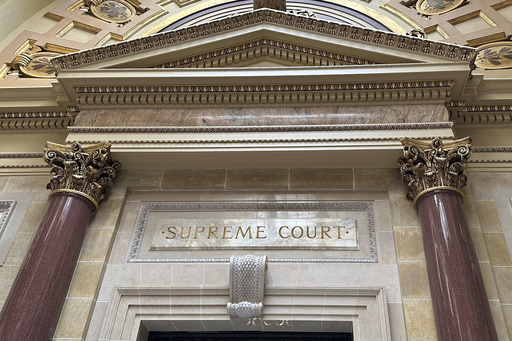
MADISON, Wis. — A liberal justice from the Wisconsin Supreme Court publicly declined a Republican request on Wednesday to step aside from a significant case that aims to reinstate collective bargaining rights for public workers—a privilege lost to many educators, nurses, and other state employees in 2011.
This development coincided with the court’s decision to refrain from addressing the unions’ appeal to hear the case before it has been fully processed in lower courts. Justice Janet Protasiewicz opted not to remove herself from the case, following a motion from Republican leaders who argued that her expressed views during her 2023 campaign made her an inappropriate presiding officer.
Protasiewicz’s choice is deemed a considerable victory for liberal advocates campaigning to overturn Act 10, legislation that effectively dismantled collective bargaining for most public employees over a decade ago. On January 30, Conservative Justice Brian Hagedorn withdrew from the proceedings; he was one of the original architects of the law while serving as chief legal adviser to then-Governor Scott Walker.
The Supreme Court’s refusal to take up the case right away indicates that a resolution is unlikely until after the upcoming election on April 1. This election is crucial for determining whether the liberal majority remains intact on the court. If a conservative candidate were to win, the court would still be evenly divided, 3-3, given Hagedorn’s recusal.
Spokesperson Christina Brey for the unions involved in the lawsuit expressed disappointment at the delay but maintained a position of confidence moving forward.
Wisconsin’s law limiting union activities has faced extensive legal scrutiny for many years. In December, seven unions representing teachers and other public sector workers initiated a lawsuit aimed at overturning the controversial law, known as Act 10. Previously, the law had survived multiple legal challenges; however, a Dane County circuit court judge found most facets of it unconstitutional, prompting the appeal to the state Supreme Court.
Act 10 stripped away collective bargaining rights for most public unions, allowing negotiations only over wage increments tied to inflation while eliminating automatic dues deductions. It also mandated annual recertification votes for unions and raised costs for health insurance and retirement benefits for public workers.
Dane County Circuit Judge Jacob Frost ruled that the law violated the equal protection provisions contained within the Wisconsin Constitution by forcing a differentiation between “general” public employees and those in “public safety” roles. Under his ruling, all public sector employees who experienced the loss of bargaining rights would regain those rights as they were prior to 2011, although this ruling has been stayed pending appeal.
The introduction of Act 10 in 2011 incited widespread protests across the state lasting several weeks, placing Wisconsin at the forefront of a national debate on union rights. It elevated Walker to a prominent national profile, incited an unsuccessful recall effort against him, and laid the groundwork for his 2016 presidential aspirations. The implementation of the law led to a sharp decline in union membership statewide, with a 2022 report from the nonpartisan Wisconsin Policy Forum indicating that Wisconsin experienced the most significant decrease in union representation since 2000.
In 2015, the Republican-led Wisconsin legislature passed a right-to-work law, further constraining private-sector unions. A successful outcome in the current lawsuit could see reinstated bargaining rights for all affected public sector workers, aligning them with the exemptions that remain for police and firefighter unions.
Debates continue regarding the efficacy and consequences of Act 10. Proponents assert that it has granted local governments greater autonomy and necessary authority to reduce operational costs. They argue that reverting the law would threaten the financial viability of schools and localities by reducing funding options through increased employee contributions. Meanwhile, Democratic opponents contend that the law has negatively impacted schools and public agencies by stripping employees of their ability to negotiate collectively for their wages and working conditions.
Protasiewicz, the newest member of the Supreme Court and a vocal opponent of Act 10 during her 2023 campaign, shifted the balance of the court in favor of liberal perspectives for the first time in 15 years. As the April 1 election approaches, which will fill the seat of a retiring liberal justice, the struggle for control over the court remains pivotal. Protasiewicz has previously stated her belief that Act 10 is unconstitutional and indicated she would think about recusing herself from cases questioning the law. Ultimately, she asserted her commitment to judging the case impartially, expressing confidence in her ability to do so effectively.
Republican leaders, Assembly Speaker Robin Vos and Senate Majority Leader Devin LeMahieu, did not respond to requests for comments regarding their motion for Protasiewicz’s recusal.

